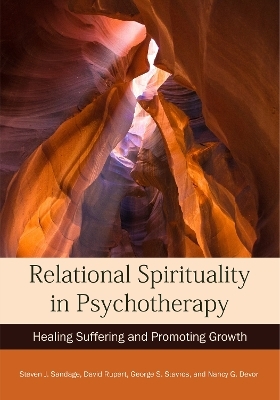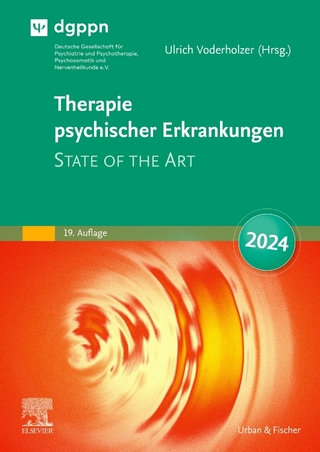
Relational Spirituality in Psychotherapy
American Psychological Association (Verlag)
978-1-4338-3166-9 (ISBN)
- Titel z.Zt. nicht lieferbar
- Versandkostenfrei innerhalb Deutschlands
- Auch auf Rechnung
- Verfügbarkeit in der Filiale vor Ort prüfen
- Artikel merken
Spiritual and existential struggles tell a story about the quality of clients’ lives, beyond what clinicians can learn from their mental health symptoms alone. This book presents the relational spirituality model (RSM) of psychotherapy, a creative clinical process that engages existential themes to help people make sense of profound suffering or trauma.
To promote healing and growth, practitioners using the RSM provide a secure yet challenging therapeutic space, while guiding clients as they explore ways of relating to the sacred in their lives. In this model, therapeutic change is seen as an intense yet safe process of movement and tension between dwelling and seeking, stability and disruption. Assessment and intervention strategies focus on developmental systems—attachment, differentiation, and intersubjectivity—to restructure relationships with the self, others, and the sacred.
In‑depth clinical case examples demonstrate how to respect diverse client perspectives on suffering and trauma, and apply the RSM in individual, couple, family, and group psychotherapy. Readers will find new ways of working within the spiritual, existential, religious, and theological concerns that infuse their clients’ struggles and triumphs.
Steven J. Sandage, Ph.D., LP, is Albert and Jessie Danielsen Professor of Psychology of Religion with a joint appointment in the School of Theology and the Department of Psychological and Brain Sciences at Boston University. He is Director of Research and Senior Staff Psychologist at the Danielsen Institute. His books include To Forgive is Human, The Faces of Forgiveness, Transforming Spirituality, The Skillful Soul of the Psychotherapist, Forgiveness and Spirituality: A Relational Approach, and Relational Integration of Psychology and Christian Theology: Theory, Research, and Practice. Sandage practices as a Licensed Psychologist in Boston, MA. David Rupert, Psy.D, LP, is the Director of Training at the Danielsen Institute, Boston University, and a licensed psychologist in private practice. He has a doctorate in clinical psychology and master’s degrees in psychology and theology from Fuller Seminary. Dr. Rupert has been in full-time clinical practice since 1996. His areas of research interest and clinical specialization are relational approaches to psychotherapy; spiritual, religious, and existential issues; cultural competence/humility and social justice; and formative approaches to training for psychotherapists. George Stavros, MDiv., Ph.D., LP, is the Executive Director of the Danielsen Institute and Clinical Associate Professor of Pastoral Psychology at Boston University. His teaching and research interests are in religion and spirituality in clinical practice and training, psychotherapy process and outcomes, and clergy and clergy family wellness. He is a licensed psychologist and holds a Master of Divinity from Holy Cross Greek Orthodox School of Theology. He is co-editor of The Skillful Soul of the Psychotherapist: The Link Between Spirituality and Clinical Excellence. Nancy G. Devor, MDiv., Ph.D., LP, is a senior staff psychologist at the Danielsen Institute at Boston University. Dr. Devor divides her career between Danielsen and the Solihten Insitute, a national network of counseling centers that have integrated faith, spirituality, and mental health care over the last sixty years. A licensed psychologist with a doctoral degree from Boston University, she received a Master of Divinity degree from Yale Divinity School and is ordained in the United Church of Christ. She is the co-author of Saying No to Say Yes: Everyday Boundaries and Pastoral Excellence.
Preface and Acknowledgments
Introduction: A Relational Model of Spiritually Integrative Psychotherapy
Part I: Theoretical Framework of Relational Spirituality
Chapter 1. Relational Spirituality After the Medical Gaze
Chapter 2. Varieties of Relational Spirituality
Chapter 3. Balancing Spiritual Dwelling and Seeking
Chapter 4. Anxiety, Relational Trauma, and Suffering
Part II: Three Relational Development Systems
Chapter 5. Attachment and Relational Spirituality
Chapter 6. Differentiation and Relational Spirituality
Chapter 7. Intersubjectivity and Relational Spirituality
Part III. Clinical Applications of the Relational Spirituality Model
Chapter 8. Relational Spirituality in Individual Psychotherapy
Chapter 9. Relational Spirituality in Couple Therapy
Chapter 10. Relational Spirituality in Group Therapy
Chapter 11. Relational Spiritual and Therapist Formation
Chapter 12: Summary and Future Research Directions
References
Index
About the Authors
| Erscheinungsdatum | 31.12.2019 |
|---|---|
| Zusatzinfo | 5 figures and 20 tables summarizing key concepts and processes, plus in-depth case studies that demonstrate how to apply the clincial mode. |
| Verlagsort | Washington DC |
| Sprache | englisch |
| Maße | 178 x 254 mm |
| Themenwelt | Geisteswissenschaften ► Psychologie ► Klinische Psychologie |
| Medizin / Pharmazie ► Medizinische Fachgebiete ► Psychiatrie / Psychotherapie | |
| Medizin / Pharmazie ► Physiotherapie / Ergotherapie ► Rehabilitation | |
| ISBN-10 | 1-4338-3166-X / 143383166X |
| ISBN-13 | 978-1-4338-3166-9 / 9781433831669 |
| Zustand | Neuware |
| Haben Sie eine Frage zum Produkt? |
aus dem Bereich


